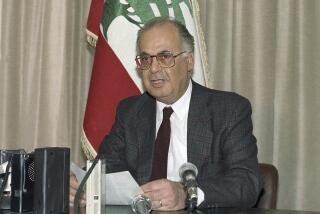Ex-Lebanese Leader Sarkis Dies at 60 in Paris Hospital
PARIS — Former Lebanese President Elias Sarkis, a taciturn lawyer who led his tortured country through six of its bloodiest years, died Thursday in a Paris hospital.
A spokeswoman for the Lebanese Embassy, who refused to give her name, would not confirm reports that the cause of death was cancer.
Sarkis, 60, a Christian, was elected president at the height of one Lebanese conflict, the civil war of 1975 and ‘76, and ended his term in the midst of another, the Israeli invasion of 1982.
His election took place with Parliament convening under heavy shelling and deputies associated with leftist and Palestinian groups boycotting the polling.
Battling in Beirut
Fighting was so heavy in Beirut that Sarkis had to be sworn in at a hotel 25 miles from the capital--in the eastern city of Shtaura--and could not enter the presidential palace for the first two months of his term.
When he finally did get to Beirut, Sarkis was unable to forge a lasting accommodation between his nation’s warring Christian and Muslim factions. At the same time, the growing independent power of the Palestinian guerrillas in Lebanon prompted two large-scale Israeli attacks, in 1978 and 1982.
Born July 20, 1924, to a shopkeeping family in a mixed Christian-Muslim mountain village, Sarkis worked as a railway clerk and eventually obtained a law degree at Beirut’s Jesuit-run St. Joseph University.
After entering the civil service, he became a protege of Lebanese army commander Fuad Chehab, who became president in 1958 and made Sarkis presidential chief of staff. He also held the job under Chehab’s successor, Charles Helou, until 1966.
Appointed Governor
Sarkis also was appointed governor of the Banque du Liban, Lebanon’s central bank, where he reorganized the country’s banking system after the collapse of the major Intra Bank.
Sarkis was nominated for the presidency in 1970 and lost to Suleiman Franjieh by one vote. Six years later, parliament chose Sarkis.
(Under Lebanon’s unwritten National Pact, the president must be a Maronite Christian. Lesser offices are designated for Muslims and members of other Lebanese religions.)
Syria Imposed Peace
Many Lebanese looked to the cool, efficient technocrat to restore order and rebuild the shaken Lebanese economy. In the end, however, it was neighboring Syria that imposed a tenuous peace in the civil war.
In June, 1982, the Israeli army invaded Lebanon for the second time in four years, but this time it drove all the way to Beirut and forced the Palestinian guerrillas to abandon their positions in the heart of the country.
Two months later, as Sarkis’ term neared an end and Beirut was under Israeli occupation, the Parliament elected Christian militia leader Bashir Gemayel to succeed him.
Gemayel was assassinated in September, 1982, and his brother, Amin, became president.
More to Read
Sign up for Essential California
The most important California stories and recommendations in your inbox every morning.
You may occasionally receive promotional content from the Los Angeles Times.










